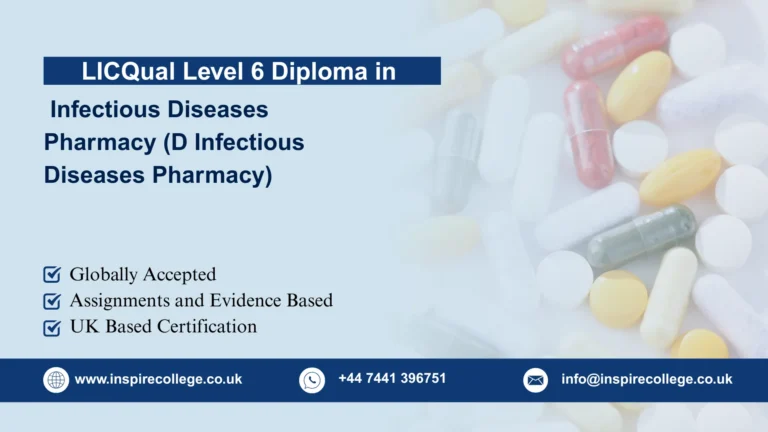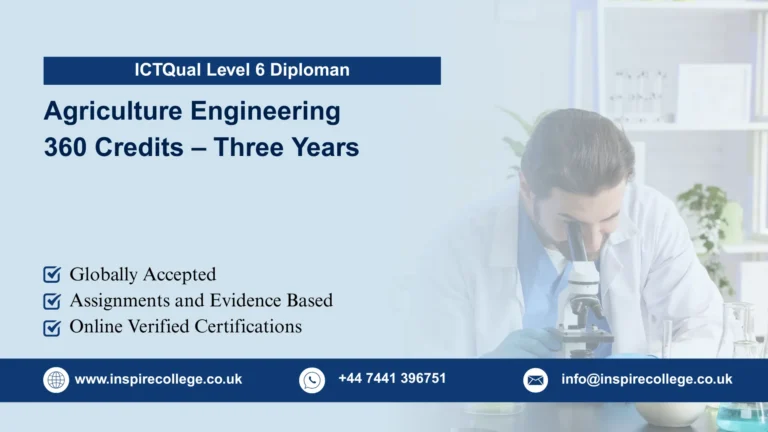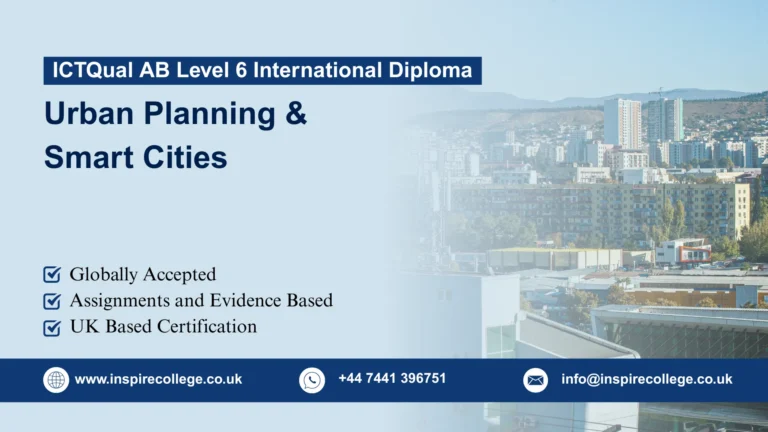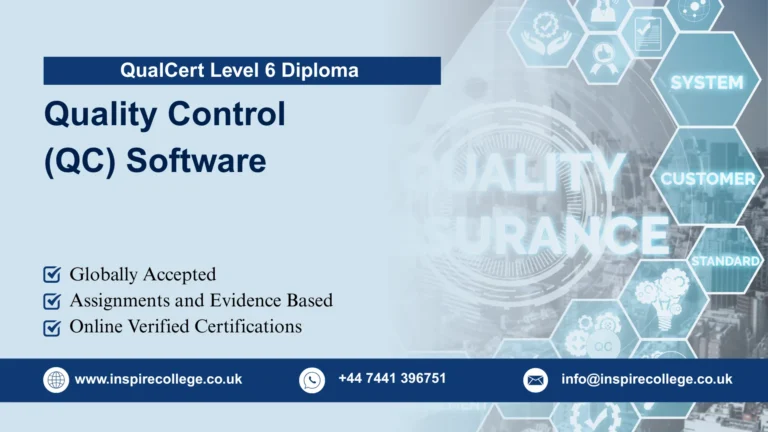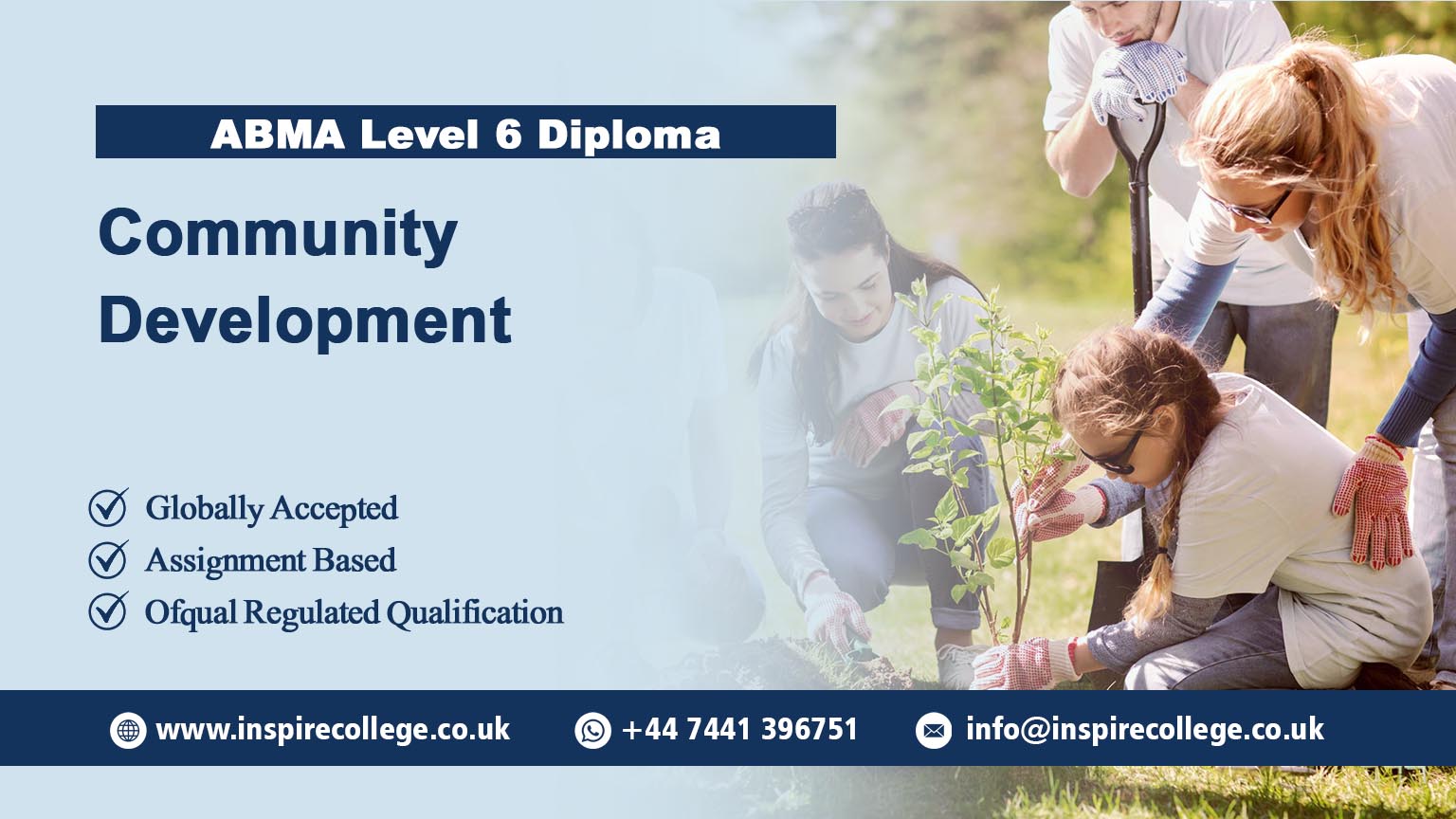
ABMA Education Level 6 Diploma in Community Development (RQF)
The ABMA Education Level 6 Diploma in Community Development (RQF) is an advanced qualification designed for individuals committed to creating lasting, positive change within their communities. This diploma provides a pathway for both experienced professionals and aspiring leaders to enhance their knowledge, refine their skills, and develop practical strategies to address complex social challenges. By combining in-depth academic learning with hands-on application, the programme ensures graduates are well-equipped to lead sustainable, impactful community development initiatives.
A key strength of the Level 6 Diploma is its strategic focus on community development. The curriculum consists of five essential units, each tackling crucial aspects of the field. The first unit, Critical Engagement with Social Policy, provides learners with a comprehensive understanding of the factors that shape social policies across both developed and developing nations. This is followed by the Leadership and Management in Community Development unit, which sharpens key leadership capabilities such as team management, conflict resolution, and cultural sensitivity—skills that are vital for driving community-focused initiatives.
The diploma programme also prioritises addressing social inequalities. The Social Inequality, Change, and Transformation unit equips learners with the tools to critically assess social disparities and devise strategies for meaningful transformation. In addition, the Reflective Practice unit promotes continuous personal and professional growth, encouraging students to adopt a reflective approach to their learning journey. The final unit, Project Management, provides practical insights into planning, executing, and managing community projects, ensuring students gain the skills needed to deliver projects that are both effective and sustainable.
This qualification is designed for a wide range of learners, including recent graduates eager to specialise in community development, professionals looking to enhance their expertise, and individuals considering a career shift into roles focused on societal impact. With its emphasis on both academic rigor and employability, the Level 6 Diploma also serves as a stepping stone for those seeking to pursue further education, such as master’s degrees in related fields.
The learning experience is dynamic and engaging, incorporating case studies, guest lectures, and collaborative projects that bridge the gap between theory and practice. These activities foster critical thinking, problem-solving skills, and provide real-world perspectives on the challenges and opportunities in community development. The programme also encourages independent research and reflective learning, empowering students to approach complex social issues with confidence and innovative solutions.
ABMA Education is globally recognised for its commitment to academic excellence and vocational relevance. The Level 6 Diploma is aligned with international qualifications frameworks, ensuring it meets the highest standards and is widely respected by employers and educational institutions. Graduates of the programme will be well-prepared to address the evolving needs of communities and contribute to their sustainable growth and development.
To enrol in the ABMA Education Level 6 Diploma in Community Development (RQF), applicants typically need to meet the following criteria:
- Educational Qualifications: Applicants should have completed a Level 5 qualification, such as a Higher National Diploma (HND), or an equivalent qualification in a relevant field like community development, social work, or a related discipline.
- Work Experience: Although not always mandatory, practical experience in a community-based setting or a related field is often preferred. This could include voluntary work or professional roles that demonstrate skills relevant to community development.
- Age Requirement: Typically, applicants must be at least 18 years old, although exceptions can be made depending on the candidate’s qualifications and experience.
Mandatory Units
The ABMA Education Level 6 Diploma in Community Development (RQF), Leadership and Innovation qualification consists of 6 mandatory units of 120 credits, Total Qualification Time: 1200, and Total Guided Learning Hours: 480 for the completed qualification.
Mandatory Units
| Unit Title | TQT | GLH | Credit |
| Unit 1: Critical Engagement with Social Policy | 240 | 96 | 24 |
| Unit 2: Leadership and Management in Community Development | 240 | 96 | 24 |
| Unit 3: Social Inequality, Change and Transformation | 240 | 96 | 24 |
| Unit 4: Reflective Practice | 240 | 96 | 24 |
| Unit 5: Project Management | 240 | 96 | 24 |
Upon successful completion of the ABMA Education Level 6 Diploma in Community Development (RQF), participants will be able to:
Unit 1: Critical Engagement with Social Policy
By the end of this unit, learners will be able to:
- Understand the key relationships and influences on policy in developed and developing countries.
- Understand the factors which inform the development of policy initiatives.
- Understand comparative policies on welfare in context.
- Understand different forms of networks and movements within international community development.
Unit 2: Leadership and Management in Community Development
By the end of this unit, learners will be able to:
- Understand leadership and management skills and responsibilities.
- Understand the process of building and leading community teams.
- Understand leading across borders and cultures.
- Understand potential causes of conflict, implications, and conflict resolution styles.
Unit 3: Social Inequality, Change, and Transformation
By the end of this unit, learners will be able to:
- Understand the causes and effects of social inequality in different contexts.
- Understand the strategies for social transformation and fostering equality.
- Understand the processes of driving community change.
- Understand the impact of change on individuals and communities.
Unit 4: Reflective Practice
By the end of this unit, learners will be able to:
- Understand the importance of reflective practice in personal and professional growth.
- Understand methods for evaluating and improving community development practices.
- Understand the role of self-awareness in leadership and decision-making.
- Understand the application of reflective tools to community development scenarios.
Unit 5: Project Management
By the end of this unit, learners will be able to:
- Understand project planning considerations necessary in a community development context.
- Understand appropriate resources required for community-based projects.
- Understand the stages in project planning and execution.
- Understand the use of project management software and tools to enhance efficiency and collaboration.
The ABMA Education Level 6 Diploma in Community Development (RQF) is designed for a variety of professionals, including:
- Recent Graduates: Those who have completed their formal education and wish to specialize in community development or pursue leadership roles in the field. It provides a strong foundation for understanding advanced concepts and applying them to real-world situations.
- Professionals in the Sector: Individuals already working in community development, social work, or related fields who want to enhance their expertise and take on leadership roles. The program helps deepen their understanding of critical issues, such as policy engagement, inequality, and project management.
- Career Changers: People seeking to transition into community-focused careers. This qualification equips them with the skills and knowledge needed to succeed in this dynamic and impactful field.
- Aspiring Academics: Learners interested in further academic study, such as master’s or postgraduate programs, will find this diploma an excellent stepping stone to advanced research or higher education in community development and related disciplines.
Whether you are looking to start, advance, or redirect your career in community development, this program provides the knowledge, skills, and recognition to make a meaningful impact locally and globally.
Register Now
FAQs for ABMA Education Level 6 Diploma in Community Development (RQF)

